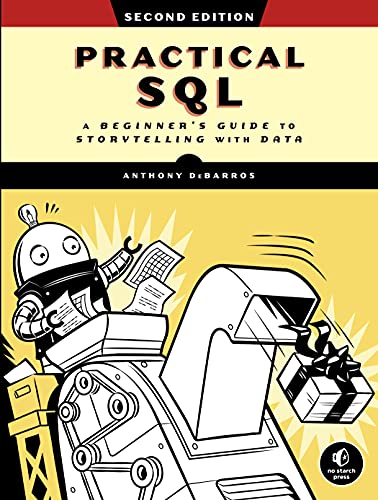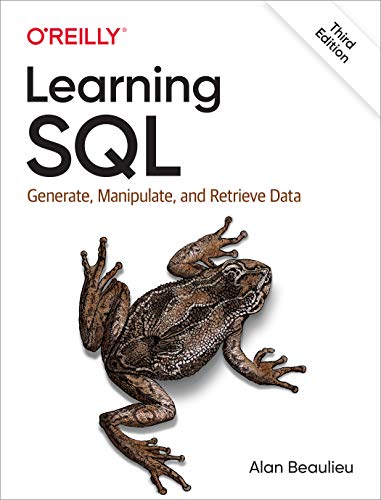8 Beginner-Friendly Relational Databases Books That Make Learning Easy
Anthony Derosa, U.S. News Editor at The Wall Street Journal, and other experts recommend these accessible Relational Databases books for newcomers eager to build solid skills.

Every expert in Relational Databases started exactly where you are now — eager but cautious about diving into database concepts and SQL syntax. The beauty of relational databases lies in their structured approach to organizing data, making them essential tools across industries today. Starting with the right resources can help you build confidence and avoid overwhelm as you learn to query, model, and manage your data effectively.
Anthony Derosa, U.S. News Editor at The Wall Street Journal, knows firsthand the importance of clear teaching when it comes to relational databases. Having worked extensively with data journalism, he praises "Practical SQL, 2nd Edition" for its approachable style and real-world examples that make SQL accessible to newcomers navigating complex datasets.
While these beginner-friendly books provide excellent foundations, readers seeking content tailored to their specific learning pace and goals might consider creating a personalized Relational Databases book that meets them exactly where they are. This way, you can focus on the skills and topics most relevant to your journey.
Recommended by Anthony Derosa
U.S. News Editor at The Wall Street Journal
“Anthony is a fantastic teacher, I can attest to this! Go get his book:” (from X)
by Anthony DeBarros··You?
by Anthony DeBarros··You?
Anthony DeBarros, a seasoned journalist with extensive experience in data-driven storytelling, crafted this book to make SQL approachable for newcomers. You’ll learn to navigate relational databases using PostgreSQL with clear examples drawn from real datasets like US Census demographics and NYC taxi rides. The book guides you through creating tables, writing queries, cleaning data, and even spatial analysis, making it ideal if you want to turn raw data into meaningful stories. Its hands-on exercises and focus on practical skills suit those who want concrete database fluency without getting lost in technical jargon.
by Alan Beaulieu··You?
by Alan Beaulieu··You?
Alan Beaulieu's decades of hands-on experience designing and implementing database applications shape this approachable guide to SQL. You’ll move through foundational concepts like creating tables and using queries, then tackle more advanced topics such as analytic functions and working with large datasets. For example, the book’s chapter on subqueries clarifies how datasets interact, which is crucial for writing efficient database applications. If you're new to relational databases and want to build practical skills without getting overwhelmed, this book lays out the essentials in digestible lessons with plenty of examples and exercises to reinforce learning.
by TailoredRead AI·
This tailored book explores the fundamental concepts of relational databases through a step-by-step, beginner-friendly approach that matches your background and learning pace. It covers core topics such as data modeling, SQL queries, normalization, and database design, providing clear explanations that remove overwhelm and build confidence. By focusing on your specific interests and goals, this personalized guide ensures you gain a solid foundation in relational databases without unnecessary complexity. The learning experience is tailored to your comfort level, making it easier to grasp essential principles and apply them effectively in real-world scenarios. Dive into relational databases with content designed just for you, making your journey both accessible and rewarding.
by Larry Rockoff··You?
by Larry Rockoff··You?
Larry Rockoff challenges the conventional approach of overwhelming beginners with exhaustive SQL syntax by focusing on core concepts and clear examples. Instead of requiring you to experiment on your computer, Rockoff’s book walks you through SQL statements in an intuitive sequence, introducing keywords one at a time and explaining their practical use. You’ll learn to query multiple databases such as Microsoft SQL Server, MySQL, and Oracle, with helpful sidebars highlighting differences among them. This book is especially useful if you want a straightforward entry point into relational databases without getting bogged down in technical overload.
by Larry Rockoff··You?
by Larry Rockoff··You?
After decades working in Business Intelligence and Data Warehousing, Larry Rockoff developed this book to demystify SQL for beginners. Instead of overwhelming you with syntax details, he emphasizes understanding the core concepts and practical uses of SQL statements, making complex queries approachable. You’ll learn how to read and write SQL code through clear examples organized logically, covering Microsoft SQL Server, MySQL, and Oracle, with notes on their differences. This book suits anyone new to relational databases who wants to grasp how to extract and analyze data without needing to install software or dive into technical jargon.
by Josephine Bush··You?
What happens when extensive database administration expertise meets a beginner-friendly teaching approach? Josephine Bush, with over a decade managing diverse data systems from finance to energy, offers a detailed yet accessible guide to SQL. You’ll learn to install and configure MySQL Workbench, write queries ranging from simple selects to advanced subqueries, and understand data manipulation and error handling. The book’s strength lies in its clear examples, such as designing databases and using aggregate functions, making complex SQL concepts approachable. If you’re starting to explore relational databases and need practical skills to query and manage data confidently, this book aligns well with your goals.
by TailoredRead AI·
by TailoredRead AI·
This tailored book explores the essential hands-on programming techniques for effective data querying and management using SQL. It offers a progressive introduction designed specifically for newcomers, focusing on foundational concepts to build confidence and reduce overwhelm. By matching content to your background and skill level, it creates a personalized learning path that encourages steady progress at your own pace. The exercises and explanations are thoughtfully crafted to deepen your understanding of SQL syntax, query construction, and database manipulation, making the learning experience engaging and approachable. This book reveals how mastering SQL can become an achievable goal through targeted, tailored instruction that addresses your specific interests and objectives.
by Kevin Jackson··You?
by Kevin Jackson··You?
Kevin Jackson is a programming expert with a deep focus on database management who created this guide to make SQL approachable for everyone. You’ll find a clear progression from basic SQL syntax to more advanced topics like stored procedures and optimization techniques, all explained in straightforward language with practical examples. For instance, chapters on querying methods and data manipulation offer hands-on exercises that help solidify your skills. If you’re a student, developer, or data analyst seeking an accessible entry point into relational databases, this book lays a solid foundation without overwhelming jargon or complexity.
by Gavin Powell··You?
by Gavin Powell··You?
The breakthrough moment came when Gavin Powell, an IT professional with over 25 years of experience, decided to simplify the often daunting world of relational database modeling for newcomers. You’ll learn how to design and build relational database models through clear explanations, numerous examples, and a multi-chapter case study that demystifies complex concepts like normalization and SQL writing. Powell’s approach benefits anyone from novice data modelers to technical managers, marketers, or even executives who want to grasp what underlies databases like MySQL or Oracle without feeling overwhelmed. Chapters like "The Art of Database Design" and "Building Faster Performing Database Models" offer concrete insights that make this book a practical starting point for your database journey.
This book transforms complex SQL concepts into accessible insights, making it a solid choice for those just starting with relational databases. Authors Alex Kriegel and Boris M. Trukhnov bridge theory and practical application by comparing SQL features across Oracle 11g, IBM DB2, and Microsoft SQL Server 2008, giving you a well-rounded understanding of how SQL operates in different environments. You’ll find detailed chapters on database objects like tables and views, transaction management, and even advanced topics such as XML integration and OLAP business intelligence. If you want a resource that grows with you from basics to more advanced SQL features, this book provides a clear pathway without overwhelming you.
Beginner-Friendly Relational Databases Just for You ✨
Build confidence with personalized guidance without overwhelming complexity.
Thousands of beginners gained confidence with these foundations
Conclusion
This collection of eight books covers the spectrum from fundamental SQL syntax to practical database modeling, all designed with beginners in mind. They emphasize clear explanations, hands-on exercises, and progressive learning to build your confidence step by step.
If you're completely new, starting with "Practical SQL, 2nd Edition" or "Learning SQL" will ground you in essential querying skills. For a smoother transition into database design, "Database Modeling from 0 to 60 in 4 seconds" offers accessible insights into structuring relational databases effectively.
Alternatively, you can create a personalized Relational Databases book that fits your exact needs, interests, and goals to create your own personalized learning journey. Building a strong foundation early sets you up for success in any data-driven career path.
Frequently Asked Questions
I'm overwhelmed by choice – which book should I start with?
Start with "Practical SQL, 2nd Edition". It offers clear, real-world examples that make SQL approachable for beginners, as recommended by Anthony Derosa.
Are these books too advanced for someone new to Relational Databases?
No, each book is selected for beginner accessibility. For example, "SQL Quick Guide" breaks down concepts in simple language without overwhelming jargon.
What's the best order to read these books?
Begin with foundational books like "Learning SQL", then explore practical programming with "Learn SQL Database Programming", and finish with modeling concepts in "Database Modeling from 0 to 60 in 4 seconds".
Should I start with the newest book or a classic?
Both have value. Newer books like "Practical SQL, 2nd Edition" include updated examples, while classics like "SQL Bible" provide depth and cross-platform insights.
Do I really need any background knowledge before starting?
No prior knowledge is needed. These books start from basics and build up concepts gradually, perfect for first-time learners.
Can personalized books complement these expert recommendations?
Yes! Personalized books tailor learning to your pace and goals, complementing expert guides perfectly. Consider creating your own personalized Relational Databases book for a focused learning path.
📚 Love this book list?
Help fellow book lovers discover great books, share this curated list with others!
Related Articles You May Like
Explore more curated book recommendations







